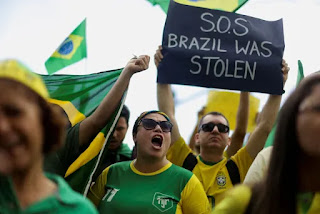Lula’s Comeback to Power in Brazil
Photo source: Washington Post
By Naveed Qazi | Editor, Globe Upfront
In Brazil, people believe that Lula has done a comeback of the century after winning the 2022 election. And he did that with a narrow margin and vowed to change the nation.
He had high approval ratings despite the notorious bribing charges in a vast corruption scheme in 2017. But this charge was refused by him and the Brazilian left. In 2021, Brazil’s supreme court overturned his conviction, decreeing that his right to a free trial had been compromised. This cleared him to run for president again, where he campaigned around rebuilding public services, addressing inequality, and bringing down energy prices and inflation. He believed that his victory was nothing more than a referendum on democracy itself.
His win brings back to the fore a coalition of Brazil’s large and disproportionately black class of the labouring poor who gave him the most support. It also included women who supported Lula overwhelmingly amid a deeply patriarchal society and many progressive elements of the middle class. Lula promises to usher back in policies that favour moderate redistribution, a commitment to deepening social rights and environmental protection, including slowing the catastrophic destruction of Amazon. To many, he sounds like a typical nationalist, and not a neo-globalist, as some perceive him to be. He has also spoken the language of a liberal American or like a few European politicians who are against racism and democracy under siege. But hold on. It was Lula who constructed a hydroelectric dam in Amazon known as Belo Monte. That time, he had convinced the Xingu tribe that it was not the end of the world. So, when it comes to environmental protections on Amazon, he has fallen short of telling the global public the truth.
Despite the paradoxes and new developments that could take place, Lula’s comeback to power has been ripe. As Bolsonaro captured international headlines, for dismantling environmental protections of the Amazonian rainforest, his fierce opposition to Covid-19 vaccines and social distancing, and a series of offensive statements about women, slum dwellers, and minorities, Lula got several political advantages ahead of him. But Bolsonaro hadn't accepted defeat initially, proclaiming at a rally that only God can remove him from office. As a former military captain and an avowed supporter of military dictatorships, he wanted the military on his side to overturn the election result. After that, Bolsonaro told a justice on Brazil’s supreme court that he wants to look ahead, and eventually accepted defeat.
In the beginning, he didn’t want to accept the election result because his campaign followers had claimed to have found a software bug in the voting machines, which would affect identification numbers. They believed that the bug would nullify about sixty per cent of votes in the machines, and had even filed a complaint for overturning the result.
By contrast before the result, Bolsonaro wanted the army to make a 'parallel vote count', according to The New York Times. The analysts also believe that military leaders are unlikely to support the coup at this tense time, despite the fact that Article 142 gives a kind of green pass for martial meddling in political affairs, no matter how much jurists bicker on its meaning.
As per reports by Time, the election day nevertheless was full of voter suppression aided by the military. In Lula’s strongholds in the north and northeast, Brazil’s federal police manned roadblocks. Locals also alleged a very high number of traffic stops for buses, disrupting travel to polling stations. In fact, during Bolsonaro’s rule, the police director general Silviney Vasquez publicly supported Bolsonaro. A few months before the election, there were also around one hundred twenty-one politically motivated attacks recorded, including fifty-four murders.
Bolsonaro’s loss also spoke of defeated American interventions in the name of Trump. As per an Oped in The New York Times by Natalia Vienna, Trump’s political games were energetically adopted in Brazil by Bolsonaro. It is believed that Bolsonaro has been supported by influential figures in the American right, who were crucial to the Stop the Seal campaign.
As a former president, Bolsonaro spent intense time and effort to build alliances in the United States, based on conspirational far-right narratives, such as the threat of Communism and cultural Marxism. His son, Eduardo was named the South American representative of The Movement, and he also founded a conservative institute that helped organise the Brazilian version of the Pro-Trump Conservative Political Action Conference. That’s where the contradictions concur because the subversion of democracy happening in Brazil in Bolsonaro’s time would never have been allowed to have happened inside American democratic institutions. Thus, by being anti-American in support for their far-right policies in Brazil, Lula could try to sustain his rule.




Comments
Post a Comment
Advice from the Editor: Please refrain from slander, defamation or any kind of libel in the comments section.